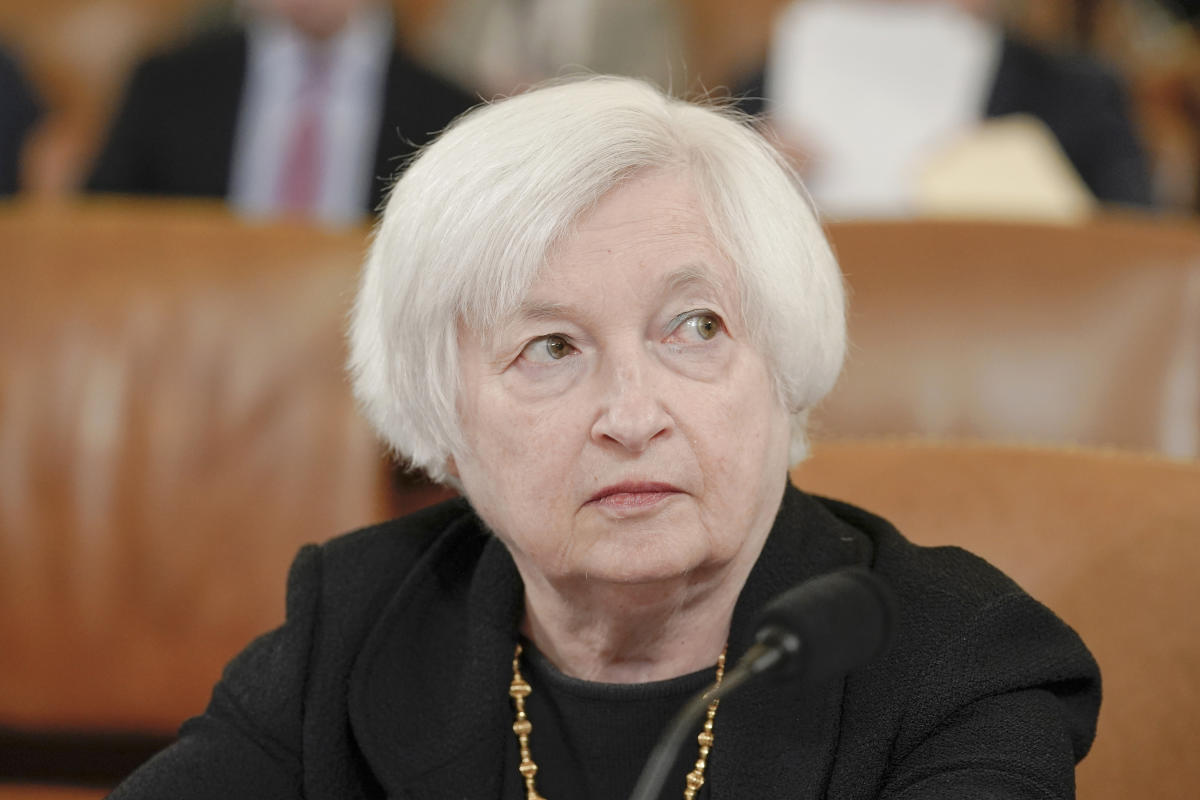WILMINGTON, Del. (AP) — Treasury Secretary Janet Yellen said Sunday that the federal government will not bail out Silicon Valley Bank, but is working to help savers who are worried about their money.
The Federal Deposit Insurance Corporation insures deposits of up to $250,000, but many of the companies and wealthy people who used the bank — known for its relationships with tech startups and venture capital — had more than that amount in their accounts. There are fears that some workers across the country will not receive their paychecks.
In an interview with CBS’s “Face the Nation,” Yellen gave few details about the government’s next steps. But she stressed that the situation was very different from the financial crisis nearly 15 years ago, which led to bank bailouts to protect the industry.
“We’re not going to do that again,” she said. “But we’re concerned about savers and we’re focused on meeting their needs.”
With Wall Street in disarray, Yellen tried to reassure Americans that there will be no domino effect after the collapse of Silicon Valley Bank.
“The US banking system is really safe and well capitalized,” she said. “It’s resilient.”
Silicon Valley Bank is the 16th largest bank in the country. It was the second-largest bank failure in U.S. history after the collapse of Washington Mutual in 2008. The bank primarily served technology workers and venture-backed companies, including some of the industry’s best-known brands.
Silicon Valley Bank began to become insolvent as its clients, mostly technology companies that needed money because they struggled to get financing, started withdrawing their deposits. The bank had to sell bonds at a loss to cover the withdrawals, leading to the largest bankruptcy of a US financial institution since the height of the financial crisis.
Yellen described rising interest rates, which have been raised by the Federal Reserve to fight inflation, as the core problem for Silicon Valley Bank. Many of its assets, such as bonds or mortgage-backed securities, lost market value as interest rates rose.
“The problems with the technology sector are not at the heart of this bank’s problems,” she said.
Yellen said she expected regulators would consider “a wide variety of available options,” including another institution’s acquisition of Silicon Valley Bank. However, so far no buyer has come forward.
Tom Quaadman, executive vice president of the U.S. Chamber of Commerce’s Center for Capital Markets Competitiveness, said in a statement that “we are urging the administration to facilitate a rapid acquisition and ensure that all bank depositors have access to have access to their cash.”
Supervisors seized the assets of the bank on Friday. Deposits insured by the federal government should be available Monday morning.
“I spent all weekend working with our banking regulators to design appropriate policies to address this situation,” said Yellen. “I can’t really give more details at this point.”
House Speaker Kevin McCarthy, R-Calif., told Fox News Channel’s “Sunday Morning Futures” that he hoped the administration would announce next steps as early as Sunday.
“They have the tools to deal with the current situation, they know the seriousness of this and they are working to come up with an announcement before the markets open,” he said.
McCarthy also expressed hope that Silicon Valley Bank would be bought.
“I think that would be the best outcome to move forward and cool the markets and get people to understand that we can move forward in the right way,” he said.
Sen. Mark Warner, D-Va., said in an interview with ABC News’ “This Week” that he was concerned that the bank’s collapse could lead nervous people to transfer money from other regional banks to larger institutions.
“We don’t want any further consolidation,” he said.
Warner suggested there would be a “moral hazard” in reimbursing depositors above the $250,000 limit and said a takeover would be the best next step.
“I’m more optimistic this morning than I was this time yesterday afternoon,” he said. “But again, we’ll see how this plays out for the rest of the day.”
He added: “What we need to focus on now is how to make sure there is no contamination.”
President Joe Biden and Governor Gavin Newsom, D-Calif., spoke Saturday of “attempting to address the situation,” though the White House did not provide additional details about next steps.
Newsom said the goal was to “stabilize the situation as quickly as possible, to protect jobs, people’s livelihoods and the entire innovation ecosystem that has served as a tentpole for our economy.”
___
Associated Press reporter Hope Yen contributed to this report from Washington.

